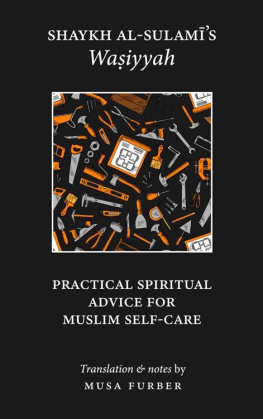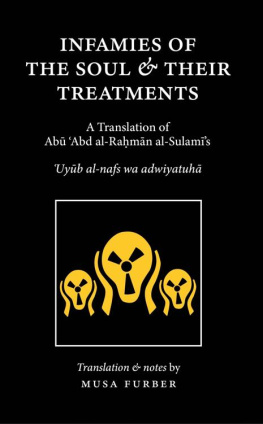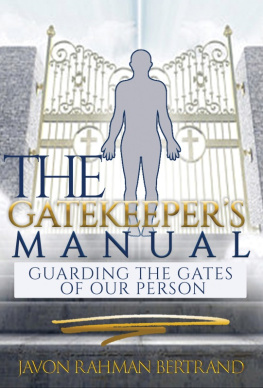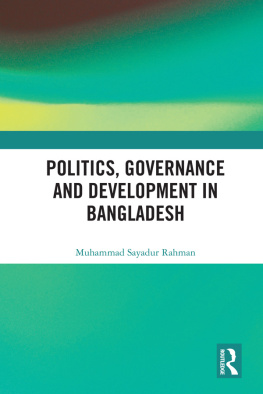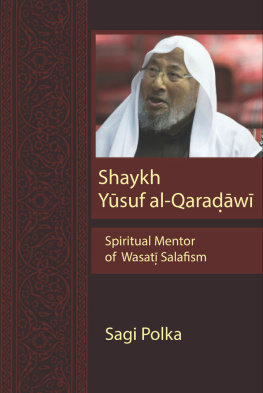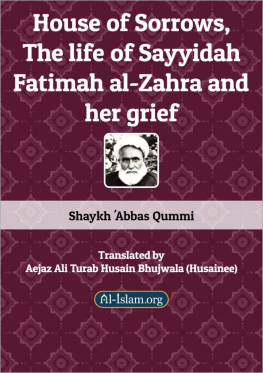Abu Abd al-Rahman al-Sulami - Shaykh al-Sulamis Wasiyyah: Practical Spiritual Advice for Muslim Self-Care
Here you can read online Abu Abd al-Rahman al-Sulami - Shaykh al-Sulamis Wasiyyah: Practical Spiritual Advice for Muslim Self-Care full text of the book (entire story) in english for free. Download pdf and epub, get meaning, cover and reviews about this ebook. year: 2020, publisher: Islamosaic, genre: Children. Description of the work, (preface) as well as reviews are available. Best literature library LitArk.com created for fans of good reading and offers a wide selection of genres:
Romance novel
Science fiction
Adventure
Detective
Science
History
Home and family
Prose
Art
Politics
Computer
Non-fiction
Religion
Business
Children
Humor
Choose a favorite category and find really read worthwhile books. Enjoy immersion in the world of imagination, feel the emotions of the characters or learn something new for yourself, make an fascinating discovery.
- Book:Shaykh al-Sulamis Wasiyyah: Practical Spiritual Advice for Muslim Self-Care
- Author:
- Publisher:Islamosaic
- Genre:
- Year:2020
- Rating:5 / 5
- Favourites:Add to favourites
- Your mark:
- 100
- 1
- 2
- 3
- 4
- 5
Shaykh al-Sulamis Wasiyyah: Practical Spiritual Advice for Muslim Self-Care: summary, description and annotation
We offer to read an annotation, description, summary or preface (depends on what the author of the book "Shaykh al-Sulamis Wasiyyah: Practical Spiritual Advice for Muslim Self-Care" wrote himself). If you haven't found the necessary information about the book — write in the comments, we will try to find it.
Shaykh al-Sulamis Wasiyyah: Practical Spiritual Advice for Muslim Self-Care — read online for free the complete book (whole text) full work
Below is the text of the book, divided by pages. System saving the place of the last page read, allows you to conveniently read the book "Shaykh al-Sulamis Wasiyyah: Practical Spiritual Advice for Muslim Self-Care" online for free, without having to search again every time where you left off. Put a bookmark, and you can go to the page where you finished reading at any time.
Font size:
Interval:
Bookmark:
Contents
In the Name of Allah, Most Merciful and Compassionate
This booklet contains the detailed counsel of Imm Ab Abd al-Rahmn Muhammad ibn al-Husayn ibn Muhammad al-Sulam (325412 AH/9371021 CE). Imm Ab Abd al-Rahmn al-Sulam has authored over one hundred works. He is most famous for his writings related to spiritual development and its masters. However, he was also an accomplished scholar of the Shfi school of law, a hadith narrator, and a historian.
The shaykh's detailed counsel contains forty-six counsels. Each counsel concerns actions Allah and His Messenger (may Allah bless him and give him peace) have commanded us to perform or avoid. Each of the actions in the counsels impacts one's physical, moral, and spiritual well-being and development. While there is a fair amount of overlap between the content of the shaykh's counsels here and his Infamies of the Soul, the presentation here is lighter. I strongly recommend that anyone who reads these two books spend more time working with the material than they spend reading it. I also recommend that they allocate their time for one to three items each weekskipping items that are not currently applicable.
I first learned about the book when I received a copy from Shaykh Amn al-Farq (may Allah protect him) who had included it in his edition of Uyb al-nafs (Infamies of the Soul). His edition was published in Damascus by Dr Maktabat al-Beirt repeatedly in the mid-1990s, along with Shaykh Amns numerous annotations.
I relied on Shaykh Amn's edition for my first draft translation, which I then corrected against other editions as I encountered them. I have followed Shaykh Amn's example in organizing the counsels into forty-six counsels and for titling the counsels. The text includes many narrations. Many of these narrations convey information attributed to the Prophet (may Allah bless him and give him peace) and his Companions (may Allah be pleased with them). Others convey information attributed to the Successors, and also from the Pious Forbears (may Allah grant them all His mercy). Many of these narrations are mentioned along with their chain of transmission. These chains and attributions are not always authentic, though the contents of the narrations are accepted. I have tried to track down the earliest source for every narration and quotation in the book, and I advise readers to consult the notes when quoting the book.
Where I have succeeded, it is only through the grace of Allah. Where I have faltered, it is from my own shortcomings. May Allah forgive the author, everyone mentioned in the book, its owners, readers, listeners, and all Muslimsliving and dead.
Musa Furber
Putrajaya
March 23, 2020
This is the counsel of Shaykh Ab Abd al-Rahmn ibn al-Husayn al-Sulam, may the Mercy of Allah be upon him. Amn! Amn!
In the Name of Allah, the Merciful and Compassionate. May the prayers and blessings of Allah be upon our master Muhammad, and upon his folk and companions.
I counsel you, O brothermay Allah perfect your successand myself to be mindful of Allah [for] it suffices for every harm. Even if you were to protect yourself from people, it would not free you from needing Allahnot one iota.
Allah Most High says, And whoever fears Allah, He will appoint a way out for him. And will provide for him from where he did not expect (Q65:23), and Allah will ease the hardship of he who fears Him (Q65:4).
I counsel you: Give priority to obeying Allah Most High and avoiding what contravenes Him. Advance towards Him wholly, return to Him at every worry, and assign it to Him. Cease inclining towards people and relying upon them. Do not dare to turn to them for any of your needs. Instead, your recourse is Allah, and your foundation and reliance are upon Him, for Allah Most High says, Allah is sufficient for the man who puts his trust in Him (Q65:3).
It is known that all people lack ability and are managed. How can one incapable of benefiting himself be capable of helping another? Thus, one of the Forebears said, People seeking aid from people is like prisoners seeking aid from [other] prisoners.
See that your family, property, or child do not distract you from Allah Most High, lest your entire life be a loss.
Allah Most High says, O believers! Let neither your riches nor your children divert you from Allahs remembrance. Those who do so, they are the losers (Q63:9).
You draw nearer to Allah Most High through remembering Him by reading His bookand by pondering, contemplating, and understanding the orders and prohibitions that address you. [Do this, then] comply with His commands and restrain yourself from His prohibitions.
Follow the Sunna of the Prophet (may Allah bless him and give him peace) in all your words and deeds, and all your material pursuits and states. Dare not contravene the Sunna in what is subtle or what is self-evident. For Allah Most High says, And let those who conspire to evade orders beware lest an affliction befall them or a painful torment (Q24:63), and If you obey him you shall have been guided (Q24:54).
Follow the course of the Righteous Forebears in commanding the right and forbidding the wrong.
Start with yourself in this, for Allah Most High says while telling the story of Shuayb (peace be upon him), I do not wish to do the opposite of what you do and commit that which I forbid you to do (Q11:88).
And Allah Most High revealed to s (peace be upon him): Preach to yourself. If you heed your own preaching, then preach to others. Otherwise: be shy from Me.
Habituate yourself with keeping company of the elite, and keeping far from the wicked. It is related that the Prophet (may Allah bless him and give him peace) said, Whoever resembles a people is one of them.
And he (may Allah bless him and give him peace) said, Whoever loves a people is one of them.
He [also] (may Allah bless him and give him peace) said, People are with the ones they love.
And he (may Allah bless him and give him peace) said, Do not accompany anyone except a believer, and do not feed anyone your food except one who fears Allah.
Ab Turb al-Nakhsh said, Keeping company with evil people leads to assuming evil in those who are good.
Do not dare to visit rulers, stepping across their carpets and assemblies, and becoming familiar with them. The Prophet (may Allah bless him and give him peace) said, Do not dare to visit them! Whoever believes their lies or aids them in their tyranny: he is not from me, and I am not from himand he will not drink from the Pool.
If you must visit them, do not deprive them of sincere advice; and order them to do the right and forbid them the wrong.
It is related that the Prophet (may Allah bless him and give him peace) said, The best of the martyrs is Hamza ibn Abd al-Muttalib and a man who stood up to a tyrant and ordered and forbade.
Minimize visiting the comfortable children who cling to this world, since visiting them and looking at their adornments renders Allahs blessings upon you small in your eye. Allah Most High says to His Prophet (may Allah bless him and give him peace), Do not strain your eyes by looking at [the worldly property] which we have given some of them to enjoy; the splendor of the life of the world, through which We only test them. The provision of your Lord is better and more lasting (Q20:131).
Font size:
Interval:
Bookmark:
Similar books «Shaykh al-Sulamis Wasiyyah: Practical Spiritual Advice for Muslim Self-Care»
Look at similar books to Shaykh al-Sulamis Wasiyyah: Practical Spiritual Advice for Muslim Self-Care. We have selected literature similar in name and meaning in the hope of providing readers with more options to find new, interesting, not yet read works.
Discussion, reviews of the book Shaykh al-Sulamis Wasiyyah: Practical Spiritual Advice for Muslim Self-Care and just readers' own opinions. Leave your comments, write what you think about the work, its meaning or the main characters. Specify what exactly you liked and what you didn't like, and why you think so.

